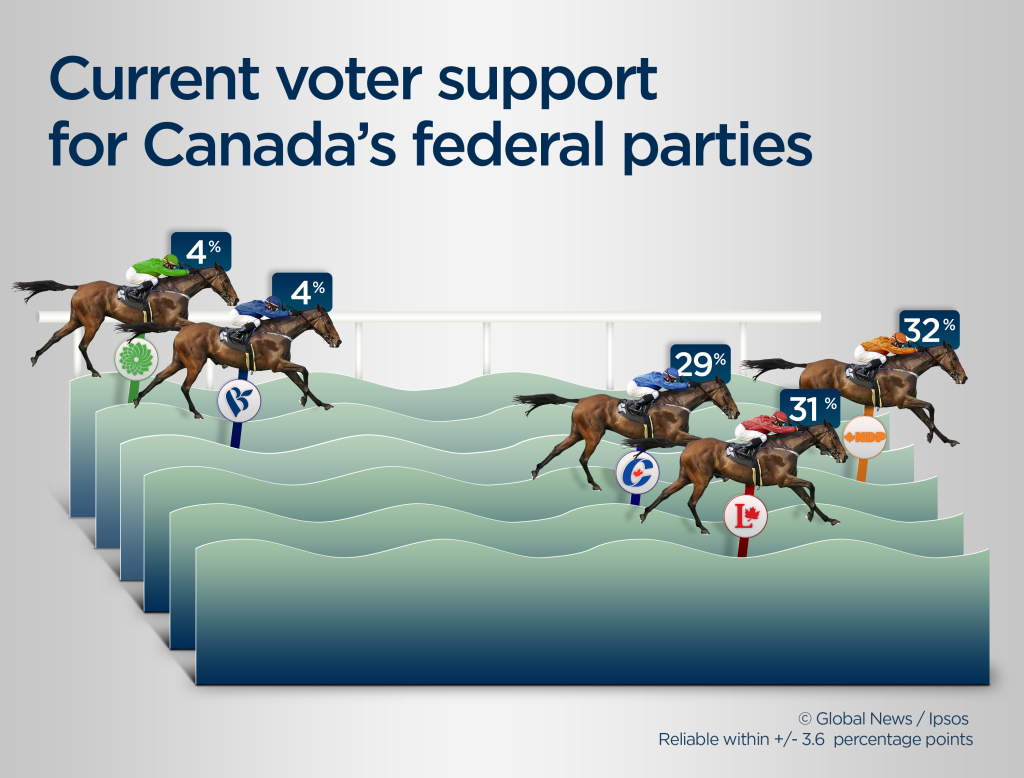Major Canadian news outlets pay extensive attention to who is currently winning the election. Either through the use of extensive polling data detailing which party is in the lead (sometimes by a fraction of a per cent) on any given day or by analyzing which federal leader won the most recent debate, the media seems to be obsessed with which party is currently winning prior to the actual election day on Oct. 19. Although Canadians are naturally interested in this, the focus on which party is currently winning is eclipsing the question of which party Canadians think should win. As put by Luke Savage in his recent article for Canadaland, this focus discourages Canadians from thinking about the reasoning behind their preferences—the what? obstructs the why?
Polling data and analysis eats up a large portion of election coverage in Canada. For example, CBC’s Poll Tracker allows you to follow how parties are polling to the tenth of a percentage on a weekly, if not daily basis. This is likely to change the mindset of a typical Canadian voter. A party that better represents a Canadian’s interests may look less appealing if you can see that it is behind in the polls. This changing mindset has been exacerbated by the fact that articles supposedly covering policy mainly reference polling data. Thus, even campaign promises are perceived within the lens of how parties are currently polling instead of what parties are promising to do.
Debates also contribute to the tendency to frame the campaign in terms of winners and losers. At the close of each debate, a panel of political pundits seeks to answer the same question: Who won? Even when pundits moved from discussing which leader won to what they actually said, analysis was still constantly drenched in data. This was especially evident in the three English-language debates, where the head of Facebook Canada provided info on which leader was discussed most over Facebook, as well as which specific moment in the debate was most talked about. The public increasingly depends on social media for a summary of the debates. This takes away from what leaders actually said, or what was actually discussed in that moment, instead focusing on how many Canadians talked about it.
The tendency to view elections as a horse race has been further exacerbated by the nature of the debates this election. Because the Conservative Party pulled out of the consortium debate this election, it was replaced with five smaller debates hosted by different Canadian news organizations. Although there have been four more debates than usual, they were not broadcast by CBC or any other Canadian broadcaster (although they were offered for free). Because the debates were more difficult to view, the number of Canadians who watched live broadcasts was a fraction of the 10.6 million viewers in 2011. In this election, only 3.8 million viewers tuned in to the Maclean’s debate. More Canadians rely on post-debate analysis, which focuses on who won rather than the issues and policies discussed.
There needs to be more discussion of policy absent polling data to allow Canadians to formulate opinions outside of the optics of the political horse race. More coverage should be given to what parties and their leaders promise outside of the lens of how they are polling. Polling could also include questions about why Canadians are voting for a certain party, thus putting what? and why? on more equal footing. Ultimately, it all comes down to what you perceive as being an effective democracy. Voting is only truly effective when people vote with their conscience for the party that best represents them, rather than based on who is winning in the polls.










